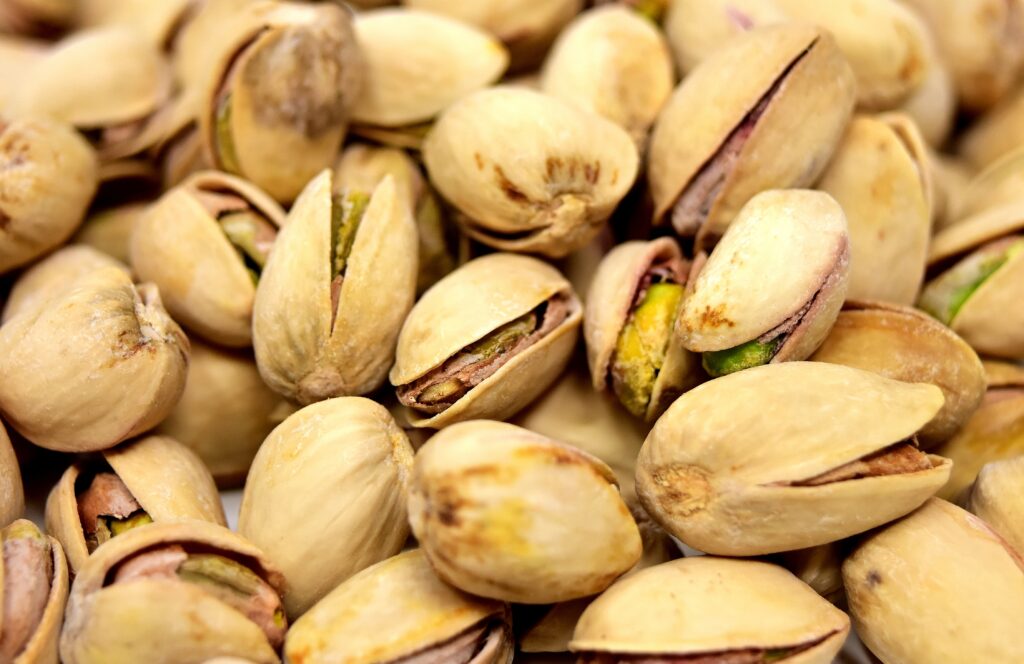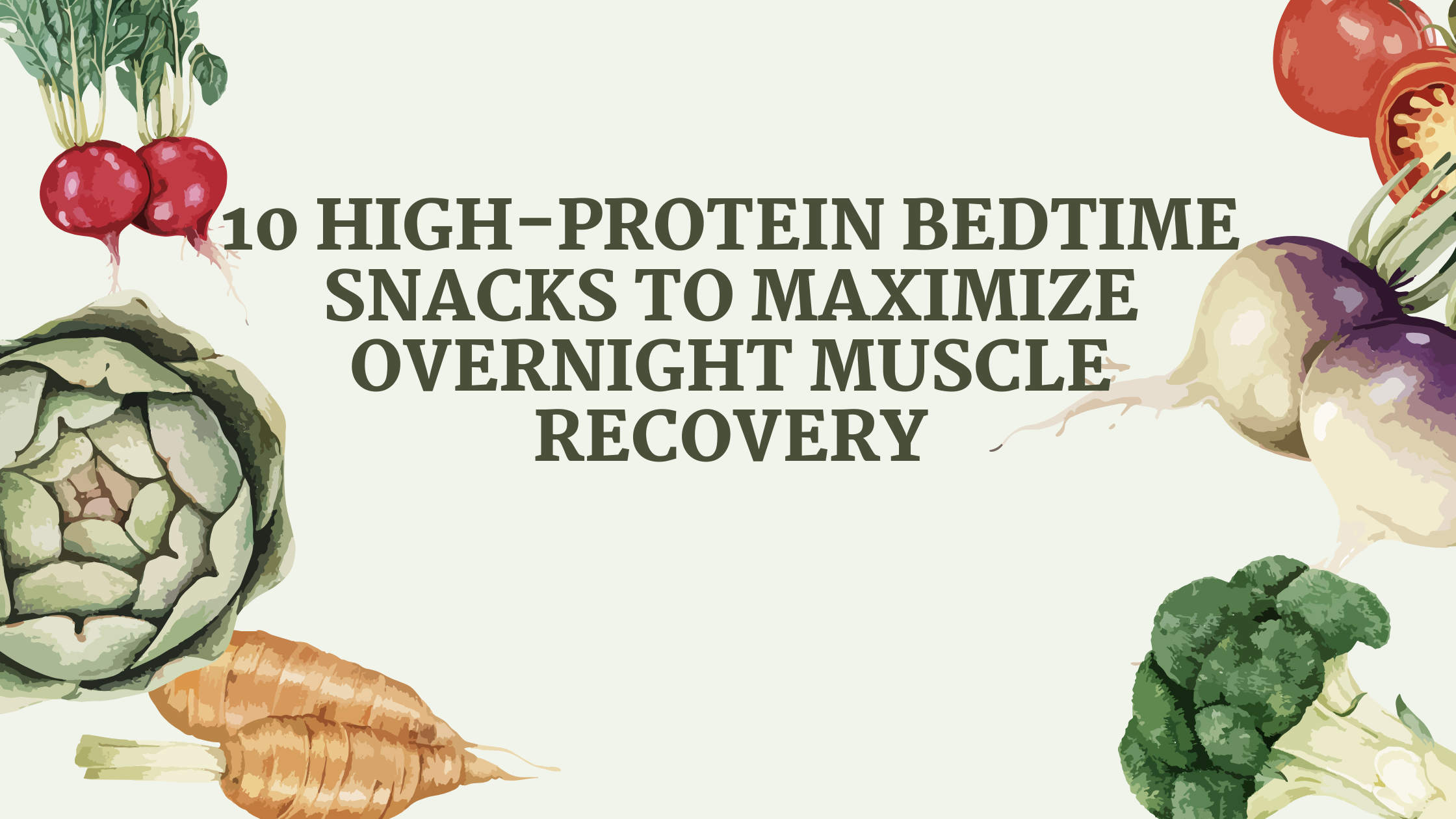
Table of Contents
When it comes to building muscle, what you eat before bed matters just as much as your workouts. While many people focus on protein intake during the day, your body continues to repair and grow muscle tissue long after the gym—especially while you sleep.
That’s where high-protein bedtime snacks come in.
These late-night eats aren’t about indulgence—they’re strategic. The right protein-rich snack can help reduce overnight muscle breakdown, support lean mass gains, and even curb unwanted cravings that might lead to mindless late-night eating.
In this post, we’ll break down 10 scientifically backed, dietitian-approved protein-packed snacks perfect for your nighttime routine.
Why Protein at Night?
During sleep, your body enters a state of recovery. Hormones like growth hormone and testosterone spike, triggering cellular repair and muscle protein synthesis.
But without amino acids available in your bloodstream, that recovery process stalls.
According to a 2012 study published in Medicine and Science in Sports and Exercise, consuming protein before bed directly increases overnight muscle protein synthesis—especially when it contains casein, a slow-digesting protein.
In short: protein before bed isn’t a gimmick. It’s science.
What Makes a Great Bedtime Snack?
Not all nighttime snacks are equal. A good pre-sleep option should be:
- Rich in protein (10–30g is ideal)
- Low in sugar and refined carbs
- Easily digestible to avoid sleep disruption
- Slow-digesting to provide amino acids over 6–8 hours
Let’s explore the top 10.
1. Cottage Cheese with Ground Flaxseed
Cottage cheese is rich in casein protein, which digests slowly, feeding your muscles all night long. Add ground flaxseed for omega-3s and fiber.
- Protein: ~25g per cup
- Calories: ~200
- Why it works: Combines protein + healthy fats + sleep-promoting tryptophan
2. Greek Yogurt + Chia Seeds
A thick, creamy snack high in protein and gut-friendly probiotics. The chia seeds offer additional fiber and omega-3s.
- Protein: ~18g (¾ cup yogurt + 1 tbsp chia)
- Calories: ~180
- Bonus: Chia helps slow digestion, keeping you fuller longer
3. Casein Protein Shake
Unlike whey, casein digests slowly over several hours, making it ideal before bed.
- Protein: ~25g per scoop
- Calories: ~120–150 depending on the brand
- Tip: Blend with unsweetened almond milk and cinnamon for extra flavor
4. Hard-Boiled Eggs and a Few Almonds
Eggs contain complete protein with all 9 essential amino acids. Add almonds for healthy fat and melatonin-promoting magnesium.
- Protein: ~13g (2 eggs)
- Calories: ~180
- Pro Tip: Sprinkle with a pinch of sea salt or turmeric
5. Protein Oatmeal (“Proats”)
Mix a half scoop of protein powder into a small serving of oatmeal. You’ll get fiber and slow carbs for stable blood sugar during sleep.
- Protein: ~20g
- Calories: ~200
- Best protein: Use a casein or plant blend to avoid rapid digestion
6. Tuna Salad Lettuce Wraps
A savory, lean protein option that’s easy on the digestive system.
- Protein: ~22g per small can (in water)
- Calories: ~120–150
- Add-ons: Mix with Greek yogurt or mashed avocado instead of mayo
7. Low-Fat String Cheese + Turkey Slices
No prep needed. Cheese provides casein and turkey provides lean muscle-repairing protein.
- Protein: ~15–20g (1 cheese stick + 2 slices turkey)
- Calories: ~170
- Sleep bonus: Turkey is naturally rich in tryptophan
8. Tofu Cubes with Soy Sauce + Sesame
Tofu is a great plant-based protein that contains isoflavones, which may even support deeper sleep.
- Protein: ~20g (½ block firm tofu)
- Calories: ~180
- How to prep: Air-fry or pan-sear lightly for flavor and crunch
9. Protein Mug Cake (Under 2 Minutes)
Craving dessert? Mix 1 scoop protein powder, 1 egg, 1 tbsp cocoa powder, and water. Microwave for 45–60 seconds.
- Protein: ~25g
- Calories: ~200
- Customizable: Add berries, nut butter, or cinnamon
10. Edamame with Sea Salt
These little green pods are packed with plant protein, fiber, and magnesium.
- Protein: ~17g (1 cup)
- Calories: ~180
- Why it’s great: High in tryptophan, B-vitamins, and iron
Bonus Tip: Avoid These Before Bed
Even if you’re hitting your macros, these can disrupt muscle recovery and sleep quality:
- High-sugar snacks (blood sugar spikes = sleep crashes)
- Spicy foods (can trigger acid reflux)
- Too much caffeine or chocolate
- Alcohol (suppresses REM sleep and muscle repair)
The Final Word: Eat to Build While You Sleep
Your muscles don’t clock out when you do. With the right high-protein bedtime snack, you can fuel muscle repair, prevent catabolism, and even improve next-day performance.
Whether you’re an athlete, bodybuilder, or simply want to age with strength, your nighttime routine matters. Make it intentional.
1. What are the best high-protein snacks to eat before bed for muscle recovery?
The best snacks are slow-digesting, high in complete protein, and easy on the stomach. Examples include:
- Cottage cheese (rich in casein protein)
- Greek yogurt with chia seeds
- Hard-boiled eggs with a few almonds
- Casein protein shake
- Tofu cubes or edamame for plant-based options
2. How much protein should a bedtime snack contain to aid overnight muscle repair?
Aim for 20–30 grams of high-quality protein. Studies (e.g., Trommelen & van Loon, 2016) show this range stimulates overnight muscle protein synthesis, especially when combined with resistance training.
3. Are casein-rich snacks more effective than whey-based snacks at night?
Yes. Casein digests slowly (over 6–8 hours), making it ideal before bed. Whey digests quickly, making it better for post-workout rather than pre-sleep. Casein supports sustained amino acid availability, which is crucial during long fasting periods like sleep.
4. Can plant-based protein snacks support muscle recovery during sleep?
Absolutely. Soy, hemp, pea, and rice proteins are all viable. While some plant proteins are incomplete, combining sources (e.g., lentils + grains) or using blended plant protein powders ensures you get all 9 essential amino acids.
5. Which dairy-free bedtime snacks deliver high protein and slow digestion?
- Tofu or tempeh cubes
- Edamame with sea salt
- Chickpea salad with olive oil
- Almond butter on whole grain toast
- Plant-based casein alternatives (e.g., micellar casein made from peas)
6. Is it safe to eat protein bars or shakes right before sleeping?
Yes, if they are low in sugar, caffeine, and artificial additives. Look for bars with:
- 20–25g protein
- <5g sugar
- Casein or plant-based protein
Avoid bars with stimulants (e.g., green tea extract) or sugar alcohols that may disrupt digestion and sleep.
7. What homemade high-protein bedtime snack recipes promote muscle synthesis?
Here are three:
- Protein mug cake: 1 scoop casein, 1 egg, 1 tbsp cocoa powder, microwave 45 sec
- Greek yogurt + peanut butter + flaxseed
- Tuna or egg salad wrapped in lettuce leaves
These combine complete proteins with healthy fats for longer satiety and slower absorption.
8. How do macronutrient ratios (protein/carbs/fat) impact overnight recovery?
- Protein: Essential for muscle repair
- Fat: Slows digestion, prolonging amino acid release
- Carbs: Aid in serotonin production (precursor to melatonin), may improve sleep quality
Ideal ratio: High protein, moderate fat, low-to-moderate complex carbs
9. Should I avoid caffeine or sugar in bedtime protein snacks?
Yes. Caffeine can delay sleep onset and reduce REM sleep. High sugar can spike blood glucose and disrupt sleep cycles. Stick to natural sugars (berries, banana slices) in moderation and ensure <5g added sugar per serving.
10. What role do amino acids (e.g., leucine) play in nighttime muscle repair?
Leucine is a key trigger of muscle protein synthesis (MPS). It activates mTOR signaling, which governs muscle growth. Ensure your snack has:
- ~2.5g leucine (found in ~25–30g high-quality protein)
Foods high in leucine: dairy, eggs, chicken, soy protein.
11. Are whole-food options (eggs, Greek yogurt) superior to processed bars at night?
Generally, yes. Whole foods:
- Provide natural micronutrients (zinc, magnesium)
- Are less inflammatory
- Are often lower in artificial additives and sweeteners
Processed bars are convenient but should not replace real food consistently.
12. Can high-protein nighttime snacks disrupt sleep quality?
Not typically, if portioned right. However:
- Large meals before bed can slow digestion, causing discomfort
- Spicy or greasy protein meals may cause acid reflux
- Hydration from shakes may cause bathroom trips at night
Stick to small, balanced portions (150–250 calories).
13. How soon before bed should I consume a recovery snack?
Consume your snack 30–60 minutes before bed. This allows for initial digestion and avoids interference with sleep onset while still supplying amino acids during early sleep stages.
14. Which snacks combine casein and healthy fats for sustained protein release?
- Cottage cheese + walnuts
- Greek yogurt + almond butter
- Low-fat string cheese + a few pistachios
- Protein pudding made with casein + flaxseed
This combo slows digestion and supports stable nighttime recovery.
15. Are there portable, pre-packaged bedtime snacks that require no prep?
Yes. Consider:
- Casein-based ready-to-drink shakes
- Hard-boiled eggs (sold in packs)
- Shelf-stable Greek yogurt or skyr cups
- Jerky (low sodium, no sugar)
- Low-sugar protein bars with casein or collagen
Always check the label for protein source, sugar content, and added stimulants.
Want More Recovery-Focused Nutrition Tips?
Check out these next:





